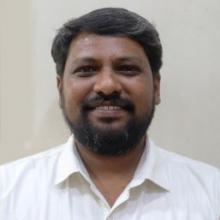-
 Contact infoEmail id:srinivasarao@ris.org.inDr. P. Srinivasa RaoFellow
Contact infoEmail id:srinivasarao@ris.org.inDr. P. Srinivasa RaoFellowDr. P. Srinivasa Rao is a Fellow at Research and Information System for Developing Countries (RIS), New Delhi. Prior to join at RIS, he worked in Fourteenth Finance Commission (14th FC) Support Cell at National Institute of Urban Affairs (NIUA). He also worked as Assistant Professor (Adhoc) in Economics at Sri Venkateswara College & Maharaja Agrasen College, as a Guest Faculty he worked in Deshbandhu College & Sri Aurobindo College from University of Delhi.
He holds PhD in Economics from Jamia Millia Islamia (A Central University), New Delhi and he did M.Phil, M.A and B.Ed from Andhra University, Visakhapatnam. His research articles on infrastructure, rural credit and microfinance etc., were published in peer reviewed journals.
At RIS, Dr. Rao is handling the work streams related to Agri- Food Systems, Food Security and Nutrition, Innovations and Digitalization, SDGs, Agri-food systems aspects of G20 and Other multilateral forums and related aspects etc.
Areas of specialization
- Agri- Food Systems
- Food Security and Nutrition
- Innovations and Digitalization
- SDGs
- G20 and Other multilateral forums
- Infrastructure and Rural Credit
Email ID: srinivasarao@ris.org.in
https://scholar.google.com/citations?user=uWfAme4AAAAJ&hl=en&oi=sra
Research Articles
- Rao, P. S., & Srinivasu, B. (2013). Infrastructure development and economic growth: Prospects and perspective. Journal of Business Management and Social Sciences Research, 2(1), 81–91. (Cited by 325)
- Rao, P. S., & Priyadarshini, Y. J. (2013). Credit options to the rural poor: Microfinance as a source of rural credit in India. International Journal of Management and Social Sciences Research, 2(4), 8–21. (Cited by 13).
- Rao, P. S., & Priyadarshini, Y. J. (2013). Microfinance and rural credit: Is it an alternative source of rural credit? International Journal of Humanities and Social Science Invention, 2(3), 28–39. (Cited by 11).
- Priyadarshini, Y., & Rao, P. S. (2014). Village-level analysis of credit and livelihood enhancement of microfinance in Andhra Pradesh. Journal of Global Economy, 10(1), 36–60.
- Rao, P. S. (2015). Disparities in infrastructure as a barrier to attaining a faster inclusive growth trajectory: An inter-state analysis. Indian Journal of Economics and Development, 11(3), 725–741. (Cited by 8).
- Rao, P. S. (2017). Infrastructure, growth, and poverty nexus in India: A state-level analysis. IUP Journal of Applied Economics, 16(4), 41–75. (Cited by 5).
- Rao, P. S. (2020). Energy infrastructure and growth: A case study of India. Urban India, 40(II), 61–85.
- Rao, P.S. (2025). “Food Security and Nutrition to Attain SDG-2: A Comparative Analysis of South Asia Region.” RIS-Discussion Paper (forthcoming).
T20 Policy Briefs in 2023 and 2024
- Financing climate-smart agriculture for sustainable agri-food systems. India Think 20 Policy Brief, TF-6: Accelerating SDGs—Exploring New Pathways to the 2030 Agenda.
- Inclusive digitalization for sustainable agri-food system transformation. Brazil Think 20 Policy Brief, TF1: Fighting Inequalities, Poverty, and Hunger.
- G20 traction for trilateral cooperation to achieve G20 Deccan high-level principles on food security and nutrition. Brazil Think 20 Policy Brief, TF1: Fighting Inequalities, Poverty, and Hunger.
- Super food millets portraying smart food pathways for climate resilience: Fructification of G20 commitments for food security and adequate nutrition. Brazil Think 20 Policy Brief, TF1: Fighting Inequalities, Poverty, and Hunger.
- Transition of agri-food systems in MGC countries: Food security, adequate nutrition, and livelihoods. Mekong-Ganga Policy Brief, 14(July), 3–7.
Book Chapter:
- Early childhood nutrition: Pathways to nurture. In B. Pandey & H. H. Ban (Eds. 2023), Investing in early years in human capital for future resilience: For an inclusive and equitable world (Chapter 7, pp. 165–204). Research and Information System for Developing Countries (RIS) & UNICEF, New Delhi.





